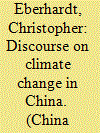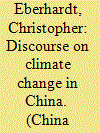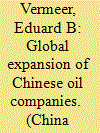|
|
|
Sort Order |
|
|
|
Items / Page
|
|
|
|
|
|
|
| Srl | Item |
| 1 |
ID:
137097


|
|
|
|
|
| Summary/Abstract |
The literal translation of avant-garde from French is ‘foreguard’. While the front has been diversely defined in various permutations of the movement, the cutting edge of avant-garde theatre in China and many post-socialist countries is largely retrospective and anti-futuristic. This is particularly true for the campus-based fringe theatre of the early 1990s, which is regarded as the highlight of avant-garde theatre in China. An alternative venue spearheaded by young theatre artists, avant-garde fringe theatre is notable for unpacking the cultural and political constructs of the Chinese socialist period as it played out through the artists’ own formative experiences. Directed by Meng Jinghu, I Love XXX chronicles the moral emotions that are central to a generation’s self-identity. The play, which is composed of more than 700 parallel sentences prefixed with ‘I love’, presents a meticulously constructed emotional archive of the generation that was born in the late socialist period and came of age in post-socialist China. Imitating rites of passage and classroom drills, the play effectively illuminates the impact affective education had on an individual’s self-perception. The fact that the play was revived in 2013 – 19 years after its initial appearance – proves its enduring relevance in contemporary China.
|
|
|
|
|
|
|
|
|
|
|
|
|
|
|
|
| 2 |
ID:
137542


|
|
|
|
|
| Summary/Abstract |
The literal translation of avant-garde from French is ‘foreguard’. While the front has been diversely defined in various permutations of the movement, the cutting edge of avant-garde theatre in China and many post-socialist countries is largely retrospective and anti-futuristic. This is particularly true for the campus-based fringe theatre of the early 1990s, which is regarded as the highlight of avant-garde theatre in China. An alternative venue spearheaded by young theatre artists, avant-garde fringe theatre is notable for unpacking the cultural and political constructs of the Chinese socialist period as it played out through the artists’ own formative experiences. Directed by Meng Jinghu, I Love XXX chronicles the moral emotions that are central to a generation’s self-identity. The play, which is composed of more than 700 parallel sentences prefixed with ‘I love’, presents a meticulously constructed emotional archive of the generation that was born in the late socialist period and came of age in post-socialist China. Imitating rites of passage and classroom drills, the play effectively illuminates the impact affective education had on an individual’s self-perception. The fact that the play was revived in 2013 – 19 years after its initial appearance – proves its enduring relevance in contemporary China.
|
|
|
|
|
|
|
|
|
|
|
|
|
|
|
|
| 3 |
ID:
137541


|
|
|
|
|
| Summary/Abstract |
In 2007 China passed the United States to become the greatest emitter of carbon dioxide (CO2). In the same year a report was published by the United Nations Intergovernmental Panel on Climate Change. Following this report, the Chinese media began to make a link between human activity and climate change. To analyse the climate discourse that has emerged since the publication of the report, this article draws on the argument of Guobin Yang and Craig Calhoun that China has a green public sphere. In China amid the messages to consume more are messages broadcast for the masses by the Chinese state and foreign non-governmental organizations (NGOs) advocating ‘green’ and ‘low-carbon’ lifestyles with little mention of climate change or questioning of existing policies. Smaller spaces or publics exist and are primarily occupied by governmental and non-governmental elites that debate and discuss climate change in serious and playful manners. Yet it is in spaces that are not public where policies are being crafted which influence the emissions of greenhouse gases in China, while citizens focus on their economic livelihood.
|
|
|
|
|
|
|
|
|
|
|
|
|
|
|
|
| 4 |
ID:
137096


|
|
|
|
|
| Summary/Abstract |
In 2007 China passed the United States to become the greatest emitter of carbon dioxide (CO2). In the same year a report was published by the United Nations Intergovernmental Panel on Climate Change. Following this report, the Chinese media began to make a link between human activity and climate change. To analyse the climate discourse that has emerged since the publication of the report, this article draws on the argument of Guobin Yang and Craig Calhoun that China has a green public sphere. In China amid the messages to consume more are messages broadcast for the masses by the Chinese state and foreign non-governmental organizations (NGOs) advocating ‘green’ and ‘low-carbon’ lifestyles with little mention of climate change or questioning of existing policies. Smaller spaces or publics exist and are primarily occupied by governmental and non-governmental elites that debate and discuss climate change in serious and playful manners. Yet it is in spaces that are not public where policies are being crafted which influence the emissions of greenhouse gases in China, while citizens focus on their economic livelihood.
|
|
|
|
|
|
|
|
|
|
|
|
|
|
|
|
| 5 |
ID:
137095


|
|
|
|
|
| Summary/Abstract |
PetroChina, Sinopec, and China National Offshore Oil Corporation (CNOOC) have been prominent instruments used by the Chinese government in its policies to ensure greater security of oil and gas supply in the face of growing domestic shortages. Chinese overseas acquisitions and activities have diversified, with a greater emphasis on offshore, gas and the Americas. Both parent and listed daughter companies are run by CCP-appointed managers who have to balance political and commercial goals. Their lacklustre financial performance can be attributed to domestic and institutional constraints, such as state-set social goals, low pricing, and government controls over their monopolies. Not only have state companies sustained losses from refining activities, but financing their rapid expansion has also increased their debts and dependency on the government. Cases of corruption have further weakened their political influence. Long-term supply contracts have made a greater contribution to the security of energy supply as compared with equity oil and gas. Nationalistic preferences for investment over trade increase company risks but are somewhat mitigated by an integral economic package approach and political backing in weak countries. Recent policies to reduce monopoly power are unlikely to produce viable commercial alternatives, but may increase the focus on listed daughter companies, overseas assets and international trading. Because of these developments and the recent fall in oil prices, a better evaluation of political and economic risks is required.
|
|
|
|
|
|
|
|
|
|
|
|
|
|
|
|
| 6 |
ID:
137540


|
|
|
|
|
| Summary/Abstract |
PetroChina, Sinopec, and China National Offshore Oil Corporation (CNOOC) have been prominent instruments used by the Chinese government in its policies to ensure greater security of oil and gas supply in the face of growing domestic shortages. Chinese overseas acquisitions and activities have diversified, with a greater emphasis on offshore, gas and the Americas. Both parent and listed daughter companies are run by CCP-appointed managers who have to balance political and commercial goals. Their lacklustre financial performance can be attributed to domestic and institutional constraints, such as state-set social goals, low pricing, and government controls over their monopolies. Not only have state companies sustained losses from refining activities, but financing their rapid expansion has also increased their debts and dependency on the government. Cases of corruption have further weakened their political influence. Long-term supply contracts have made a greater contribution to the security of energy supply as compared with equity oil and gas. Nationalistic preferences for investment over trade increase company risks but are somewhat mitigated by an integral economic package approach and political backing in weak countries. Recent policies to reduce monopoly power are unlikely to produce viable commercial alternatives, but may increase the focus on listed daughter companies, overseas assets and international trading. Because of these developments and the recent fall in oil prices, a better evaluation of political and economic risks is required.
|
|
|
|
|
|
|
|
|
|
|
|
|
|
|
|
| 7 |
ID:
137543


|
|
|
|
|
| Summary/Abstract |
This article investigates the cinematic representation of Taiwanese businesspeople’s (taishang 台商) family relations in China, and the concomitant transformation of homeness. The emergence of Taiwanese enterprises in China began in the late 1980s, and the attendant migration has resulted in the separation of families and a change in women’s roles as their husbands travel between Taiwan and China. This article sheds light on how documentary film portrays cross-Strait migration, as seen through the lens of taishang wives. Two documentary films – Chang’e’s Monthly Visit (嫦娥月事, 2003) and A Wife’s Stage (太太的舞台, 2003) – respectively produced by Taiwanese and PRC filmmakers are discussed to demonstrate the transformation of women’s roles within the domestic sphere and the reinvention of homeness. Homeness is used as a trope of representational politics on both sides of the Taiwan Strait, and as a site of cultural production impacted by migration. This article argues that in Taiwanese documentary filmmaking, home is associated with the split family structure through the portrayal of wives as subordinated victims, whereas PRC filmmakers present China as an ideal and harmonious homeland.
|
|
|
|
|
|
|
|
|
|
|
|
|
|
|
|
| 8 |
ID:
137098


|
|
|
|
|
| Summary/Abstract |
This article investigates the cinematic representation of Taiwanese businesspeople’s (taishang 台商) family relations in China, and the concomitant transformation of homeness. The emergence of Taiwanese enterprises in China began in the late 1980s, and the attendant migration has resulted in the separation of families and a change in women’s roles as their husbands travel between Taiwan and China. This article sheds light on how documentary film portrays cross-Strait migration, as seen through the lens of taishang wives. Two documentary films – Chang’e’s Monthly Visit (嫦娥月事, 2003) and A Wife’s Stage (太太的舞台, 2003) – respectively produced by Taiwanese and PRC filmmakers are discussed to demonstrate the transformation of women’s roles within the domestic sphere and the reinvention of homeness. Homeness is used as a trope of representational politics on both sides of the Taiwan Strait, and as a site of cultural production impacted by migration. This article argues that in Taiwanese documentary filmmaking, home is associated with the split family structure through the portrayal of wives as subordinated victims, whereas PRC filmmakers present China as an ideal and harmonious homeland.
|
|
|
|
|
|
|
|
|
|
|
|
|
|
|
|
|
|
|
|
|